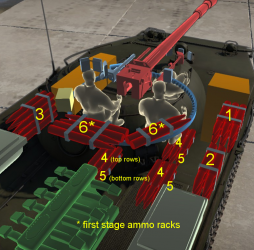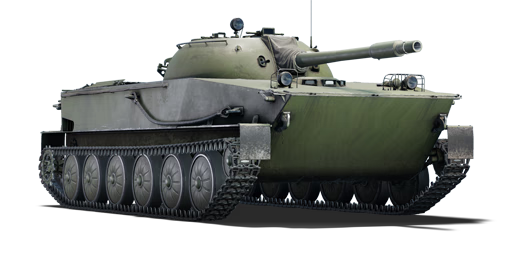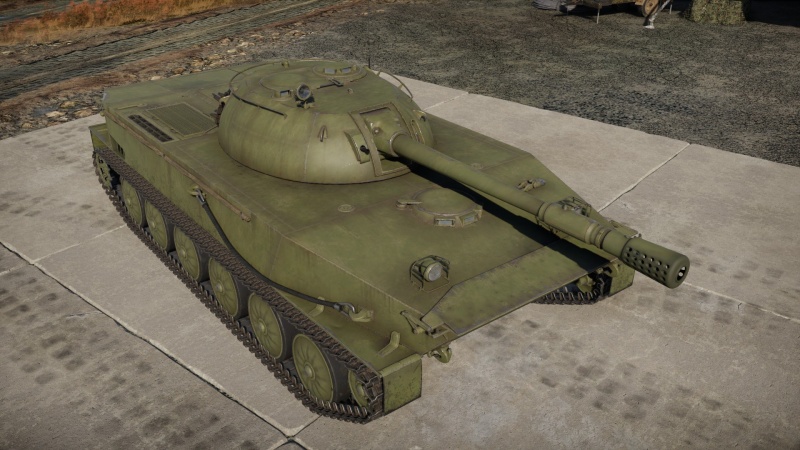Object 211
Contents
Description
The Object 211 is a prototype designed by the Chinese People's Liberation Army in the late 1950s to produce an effective amphibious tank. By 1957, the structure of the Chinese People's Liberation Army had been revised, and the Chinese Marines were integrated into the Chinese Army. The southeast coastal areas remained unstable as the Chinese Nationalist Army in Taiwan, led by the Kuomintang, has not abandoned the goal of "counterattacking the mainland." Since Southern China is mountainous and has a lot of rice fields with water networks and rivers, it was considered that medium and heavy tanks would be unsuitable and amphibious vehicles would play an indispensable role during defence. In July 1958, a development code called "Project 211" was assigned, and China purchased the Soviet Union's PT-76 amphibious tank to acquire the technologies. The program initially encountered various challenges due to the Chinese tank industry's inadequate technologies at the time, primarily as a result of World War II and the Civil War. Nonetheless, by the early 1960s, the program had proven to be a success, and it was ready for production as the Type 63 amphibious light tank. The model in-game represented the 4th prototype with new Type 62 85 mm cannon now displayed at Block 4 of family housings at Institute 201 (aka China North Vehicle Research Institute, 中国北车研究所).
Introduced in Update "La Royale", Object 211 is a unique tank that can provide players with significant insights into the Chinese tank development philosophies that were influenced by the Soviet Union during the late 1950s. Due to the diversity of landscapes in China at the time, several tank designs were needed to effectively defend the mainland against potential adversaries. Since the prototype was intended to be amphibious, it was lightly armoured and offered low protection only against light machine guns and artillery shrapnel. However, due to its low profile and high speed, Object 211 will give players the advantage of taking strategic areas early in the battle. The 85 mm Type-62-85-TC tank gun has excellent firepower and can readily engage and dispatch adversaries with a single well-placed shot.
General info
Survivability and armour
Describe armour protection. Note the most well protected and key weak areas. Appreciate the layout of modules as well as the number and location of crew members. Is the level of armour protection sufficient, is the placement of modules helpful for survival in combat? If necessary use a visual template to indicate the most secure and weak zones of the armour.
Armour type:
- Rolled homogeneous armour (hull)
- Cast homogeneous armour (turret)
| Armour | Front (Slope angle) | Sides | Rear | Roof |
|---|---|---|---|---|
| Hull | 10 mm (82°) UFP 15 mm (45°) LFP |
10 mm | 8 mm | 80 mm |
| Turret | 20 mm Turret front 50 mm Gun mantlet |
20 mm | 20 mm | 8 mm |
| Cupola | 8 mm | 8 mm | 8 mm | 8 mm |
Notes:
- Suspension wheels are 20 mm thick, tracks are 30 mm thick, and torsion bars are 60 mm thick.
Mobility
Like its in-service cousin Type 63, the tank is also equipped with the same 12150L-2 V12 diesel engine which has max output at 400 hp and could travels up to 64 km/h on road or at 11 km/h while on water; a major improvement from its Soviet counterpart PT-76. Making it a fast and nimble tank to hit vantage points.
| Game Mode | Max Speed (km/h) | Weight (tons) | Engine power (horsepower) | Power-to-weight ratio (hp/ton) | |||
|---|---|---|---|---|---|---|---|
| Forward | Reverse | Stock | Upgraded | Stock | Upgraded | ||
| Arcade | Expression error: Unexpected * operator. | 620 | Expression error: Unexpected round operator. | __.__ | |||
| Realistic | 354 | Expression error: Unexpected round operator. | __.__ | ||||
Modifications and economy
Armaments
Main armament
After previous domestic 76 mm was proved unviable in the 1960s and was rather unreliable, while the other prototype with ZIS-S-53 has high recoil to the chassis on water, Chinese engineers eventually opted for the new 85 mm cannon for Object 211. Previous players of Type 62 and 63 will be very familiar to its performance minus the HEAT or even APFSDS rounds; while new players will certainly enjoy the 85 mm gun that packs a punch and a magnification at up to 7x, they will have to be extra careful with the slow turret traverse speed.
| 85 mm Type-62-85-TC | Turret rotation speed (°/s) | Reloading rate (seconds) | |||||||||||
|---|---|---|---|---|---|---|---|---|---|---|---|---|---|
| Mode | Capacity | Vertical | Horizontal | Stabilizer | Stock | Upgraded | Full | Expert | Aced | Stock | Full | Expert | Aced |
| Arcade | 47 | -4°/+22° | ±180° | - | 9.5 | 13.2 | 16.0 | 17.7 | 18.8 | 9.62 | 8.51 | 7.84 | 7.40 |
| Realistic | 5.9 | 7.0 | 8.5 | 9.4 | 10.0 | ||||||||
Ammunition
| Penetration statistics | |||||||
|---|---|---|---|---|---|---|---|
| Ammunition | Type of warhead |
Penetration @ 0° Angle of Attack (mm) | |||||
| 10 m | 100 m | 500 m | 1,000 m | 1,500 m | 2,000 m | ||
| Type 56 APBC | APHEBC | 135 | 133 | 124 | 113 | 104 | 95 |
| Type 56 HE | HE | 19 | 18 | 17 | 16 | 15 | 14 |
| Type 56 APCBC | APCBC | 164 | 162 | 154 | 143 | 134 | 125 |
| Shell details | ||||||||||||
|---|---|---|---|---|---|---|---|---|---|---|---|---|
| Ammunition | Type of warhead |
Velocity (m/s) |
Projectile mass (kg) |
Fuse delay (m) |
Fuse sensitivity (mm) |
Explosive mass (TNT equivalent) (g) |
Ricochet | |||||
| 0% | 50% | 100% | ||||||||||
| Type 56 APBC | APHEBC | 792 | 9.2 | 1.2 | 14 | 164 | 48° | 63° | 71° | |||
| Type 56 HE | HE | 785 | 9.54 | 0.2 | 0.1 | 741 | 79° | 80° | 81° | |||
| Type 56 APCBC | APCBC | 792 | 9.2 | 1.2 | 14 | 77 | 48° | 63° | 71° | |||
Ammo racks

| Full ammo |
1st rack empty |
2nd rack empty |
3rd rack empty |
4th rack empty |
5th rack empty |
6th rack empty |
Visual discrepancy |
|---|---|---|---|---|---|---|---|
| 47 | 39 (+8) | 33 (+14) | 25 (+22) | 16 (+31) | 7 (+40) | 1 (+46) | No |
Notes:
- Shells are modeled individually and disappear after having been shot or loaded.
- Rack 6 is a first stage ammo rack. It totals 6 shells and gets filled first when loading up the tank.
- This rack is also emptied early: the rack depletion order at full capacity is: 6 - 1 - 2 - etc. until 5.
- Not firing when the gun is loaded will move ammo from racks 1-5 into rack 6. Firing will interrupt the restocking of the ready rack.
Machine guns
| 7.62 mm SGMT | ||||
|---|---|---|---|---|
| Mount | Capacity (Belt) | Fire rate | Vertical | Horizontal |
| Coaxial | 3,250 (250) | 600 | - | - |
Usage in battles
As the project number and its design suggests, Object 211 is what set the foundations for the ZTS63 family which was PLA's weapon of choice when crossing battlefields with extensive water networks. As there was no need for an amphibious tank with crew compartments, the overall size could be further shrunken to an even small size. The turret design be reminiscent of the Type 62's oval shape turret, but the Object 211's is even smaller: enemy tanks very unlikely to find the 211 while hiding in vegetation. The size and function also means that the protection will not be anywhere near normal non-amphibious light tanks: the overall protection is only rated for .50 calibre at most, skirt heated frontlines and avoid any vehicles with autocannons at all costs as the 211 will meet its end rather quickly. Be sure to keep the crew alive as much as possible, since it has a 3 men crew rather than 4 in Type 62 or 63; although it is more likely that the Object will be knocked out by enemy shells right away, any reduction on crew also further lowers its combat capability. The major problem goes to the turret traverse, this turret with a 85 mm cannon turns extremely slowly, so be prepared to turn the turret beforehand for maximum reaction time.
Once players have clear information on these flaws, they can now utilize the tank like most other light tanks around its tier: be sneaky and hit enemies from the sides. While the tank doesn't have the highest depression angle among light tanks, it has an ace up its sleeve - its 85 mm gun. While it doesn't have access to BR-365P, BR-367 has even higher penetration at 164 mm point-blank; sharing the same ballistic performance to the T-34 S-53, players using PLAGF tanks will soon get on hand with the cannon. In most cases, the explosive content is more than enough to disable even the most heavy tanks at its tier, if not knocking them out right away. Since the gun itself doesn't have the highest penetration and lacks the capability to face enemies up front, taking the sides is always a good idea to at least harass the enemies if not bringing devastation from the flanks. Use the terrain to compensate for the lack of depression angle if needed as it has only -4°. If sometimes the map doesn't have the required room for manoeuvre or enemies have already taken vantage points while there are some water bodies, the Object 211 has another card on hand: being amphibious. Be sure to learn the map beforehand and find any possible points to go back onto land. Due to the lack of a stabilizer, it is not a good idea taking it as a gunboat on water as the gun will vibrate. If it happens that another PT-76B is taking the same route, the 211 will have a hard time fight back, using the high on-water speed is the key to navigate in water bodies as fast as possible.
Pros and cons
Pros:
- Devastating 85 mm cannon with high-end 85 mm APCBC
- Low profile
- Faster than most tracked light tanks at its tier
- Good optic magnification at 3.5x-7x
- Amphibious with high on-water speed at 11 km/h
Cons:
- Thin overall protection is not ideal, only rated to .50 machine guns
- Slow turret traverse speed
- Lacks APCR/HEAT for well-protected targets
- Relatively low reload time
- Rather low depression angle
History
Describe the history of the creation and combat usage of the vehicle in more detail than in the introduction. If the historical reference turns out to be too long, take it to a separate article, taking a link to the article about the vehicle and adding a block "/History" (example: https://wiki.warthunder.com/(Vehicle-name)/History) and add a link to it here using the main template. Be sure to reference text and sources by using <ref></ref>, as well as adding them at the end of the article with <references />. This section may also include the vehicle's dev blog entry (if applicable) and the in-game encyclopedia description (under === In-game description ===, also if applicable).
Media
- Skins
See also
- PT-76 - The inspiration to Object 211 and future ZTS63 series
- ZTS63 family
External links
Paste links to sources and external resources, such as:
- topic on the official game forum;
- other literature.
| China light tanks | |
|---|---|
| Type 63 | Object 211 · Type 63 · ZTS63 |
| Type 62 | Type 62 |
| WZ551 | ZSL92 · PTL02 · WMA301 |
| ZBL08 | ZLT11 |
| Type 86 | ZBD86 |
| WZ502 | ZBD04A |
| ROC | M41D · M64 |
| Type 59 | QN506 |
| USA | ␗M8 LAC · ␗M3A3 Stuart · ␗M3A3 (1st PTG) · ␗M5A1 · ␗M24 · ␗M18 GMC · ␗M41A3 |
| USSR | ␗T-26 · T-26 No.531 · ␗PT-76 |





